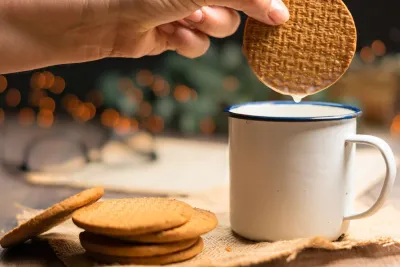The Impact of Sugar on Sleep: Understanding the Connection
Chilipad Editorial Team • Oct 17, 2024

Key Takeaways
Eating too much sugar—especially close to bedtime—can disrupt sleep by destabilizing blood sugar, hormones, and the brain’s ability to stay in deeper sleep stages.
- Consuming sugary foods or drinks before bed can increase restlessness, nighttime awakenings, and overall poor sleep quality.
- Sugar causes rapid blood sugar spikes followed by crashes, which can confuse your body’s natural sleep-wake rhythm and trigger nighttime alertness.
- High sugar intake interferes with key hormones like cortisol and insulin, both of which influence energy levels and sleep timing.
- Research suggests diets high in added sugar may reduce REM sleep, the stage critical for memory, emotional regulation, and mental recovery.
- For better sleep, choose evening snacks with protein, fiber, or complex carbohydrates to support steadier blood sugar and deeper rest.
We’ve all been there—craving something sweet after a long day. But that late-night chocolate bar or sugary drink might be doing more than hitting the spot—it could be sabotaging your sleep.
So, does sugar really cause issues with sleep? Absolutely. That quick fix may be the hidden reason you’re tossing, turning, and waking up groggy.
Sure, sugar feels like a treat, but behind the scenes it’s stirring things up, keeping your body restless when it should be recharging. Below, we’ll break down how sugar quietly undermines sleep and why cutting back could mean waking up actually refreshed.
Why Sugar is The Hidden Enemy of Sleep
Hidden sugar is everywhere these days, in snacks, energy drinks, and even foods you wouldn’t expect. Compared to how our ancestors ate, we’re taking in way more than our bodies are built for.
That sugar overload isn’t just linked to health problems down the line, it’s also wrecking one of the most underrated pillars of well-being: your sleep.
Americans are in the midst of a sugar epidemic. The average person consumes a staggering 17 teaspoons of added sugar daily—a figure that surpasses the recommended intake for women by more than double and for men by triple. [1]
This sugar overload translates to a weight gain of roughly 60 pounds annually, a mass equivalent to the weight of an average Labrador Retriever.
These alarming numbers underscore the severity of the issue and emphasize the need to reassess our relationship with this sweet menace.
**Did You Know:**Eating too much added sugar has been tied to restless nights and poor sleep. It's just another reason to keep an eye on how much sneaks into your diet. [2]

Keeps You Wired
Sugary snacks and drinks send your blood sugar on a wild ride—spike, crash, repeat. That rollercoaster can leave you restless, hungry, or even parched in the middle of the night. On top of that, sugar’s brain-stimulating kick makes it harder to actually fall asleep.
But the effects don’t stop there. Regular sugar overload can contribute to weight gain, which raises your risk of sleep disorders such as sleep apnea—a condition that causes repeated breathing interruptions at night. It’s also linked to type 2 diabetes, another health issue that often goes hand-in-hand with poor sleep.
Not all sugars are created equal, though. Natural sugars from fruits and veggies come packaged with nutrients and can even support better sleep.
The real troublemakers? Added sugars in processed foods and sweetened drinks. Those are the ones most likely to keep you from getting quality sleep.
Related Blog: Foods That Help You Sleep
Let Us Help Improve Your Sleep
Our bed cooling system, the Chilipad Dock Pro, offers personalized temperature regulation, resulting in a better night's sleep.
How Sugar Hijacks Your Sleep Cycles
Too much sugar doesn’t just mess with your diet—it messes with your sleep architecture. Instead of drifting smoothly through light, deep, and REM stages, your night gets chopped up with frequent wake-ups and restless tossing.
Here’s why: sugar spikes your blood glucose, then crashes it. That crash signals mild stress to your body, which releases adrenaline and cortisol—the same hormones that keep you alert. So even if you fall asleep, your body might jolt you awake multiple times as it tries to rebalance.
The result? Less time in deep, restorative sleep—the stage your body uses for repair, memory consolidation, and overall recovery. You wake up feeling like you barely slept, even if you logged eight hours.
Over time, this cycle of fragmentation can slide into chronic sleep deprivation, with all the health risks that come with it. Keeping your sleep cycle intact starts with smarter choices around sugar—and healthier habits that actually support sleep.
Sugar Steals Your Deep Sleep
Deep sleep, also known as Slow-Wave Sleep, is a state in which your body enters full repair mode. But overload on sugar, and that restorative stage takes a serious hit.
Here’s what happens: your body scrambles to pump out insulin to handle the sugar, metabolism revs up, and your core temperature rises. That extra activity makes it harder to sink into deep, uninterrupted sleep.
Blood sugar spikes and crashes add to the chaos, causing brief wake-ups and triggering stress hormones like cortisol that further chip away at your rest. The result? Less time in the stage of sleep your body needs most for recovery, memory, and overall health.
Cutting back on sugar helps protect deep sleep, so your body actually gets the chance to do the heavy lifting of restoration while you’re out cold.
Why Deep Sleep Matters
- Physical Repair and Growth: This is when your body goes into maintenance mode—fixing tissues, rebuilding muscle, and boosting your immune system.
- Memory Bank: Your brain organizes and locks in memories, sharpening focus, learning, and overall cognitive function.
- Brain Toxins: Spinal fluid sweeps through, flushing out toxins that build up during the day.
Study: research shows people who eat a lot of sugar spend less time in deep sleep and experience more nighttime restlessness. That means fewer of these crucial benefits. [3]
Not getting enough deep sleep hits hard the next day. Picture yourself at work after a restless night—your focus slips, mistakes pile up, and by the afternoon, you’re running on empty.
Related Blog: Tips for How to Increase Deep Sleep Naturally
Can Contribute to Sleep Disorders
Consuming too much sugar is associated with gaining weight, which in turn can raise the likelihood of experiencing sleep apnea and other sleep-related disorders.
Sugar can negatively impact sleep quality and contribute to sleep issues. A high sugar diet and large consumption can lead to difficulties in falling and staying asleep, further illustrating the connection between sugar intake and sleep disruptions.
When you consume excessive sugar, your body stashes the surplus calories as fat, which can eventually result in noticeable increases in body mass. Carrying additional weight, particularly around the neck and throat, can exert pressure on your airway, making breathing more difficult.
How Sugar Sets You Up for Sleep Trouble:
- Weight Gain: Too much sugar often translates into extra pounds.
- Airway Pressure: Added weight around the neck can narrow your airway.
- Sleep Apnea: That narrowing raises the risk of sleep apnea—when breathing repeatedly stops and starts through the night.
- Other Sleep Disruptions: Extra body fat from a high-sugar diet can also fuel snoring, restlessness, and constant tossing and turning.
Why it Matters:
- Interrupted Sleep: Frequent wake-ups keep you from getting the deep, restorative rest your body needs.
- Serious Health Risks: Long-term poor sleep is linked to high blood pressure, heart disease, and diabetes.
- Daytime Fallout: Low-quality sleep leaves you drained, foggy, and less effective at work and in daily life.
Keep an eye on your health and sugar intake—it can sneak up on you, leading to added body fat and increasing the risk of breathing-related sleep issues and other nighttime disturbances.
If you suspect that sugar affects your sleep, you can track your sugar intake. Cutting back on sugar can help you maintain a healthy weight and enhance the quality of your sleep.
Increases Inflammation
Inflammation can seriously disrupt sleep in several ways. It can interfere with the body's natural sleep-wake cycle due to cytokine-related inflammatory signals.
These signals can interfere with both falling asleep and staying asleep. It's important to consider that sugar significantly contributes to inflammation and significantly impacts this disruption.
The inflammatory process often results in pain, stiffness, and increased cortisol levels, all of which are detrimental to achieving a restful night's sleep.
Study: Excessive sugar consumption increases the production of harmful compounds called AGEs, which cause oxidative stress and inflammation. [4]
Apart from causing direct inflammation, sugar also disrupts the balance of gut bacteria, which further fuels inflammation. To make matters worse, sugar elevates cholesterol, another inflammatory trigger.
Hormonal Imbalance
As hormone levels fluctuate, the body experiences various changes. Elevated adrenaline, the body's natural alarm system, can lead to feelings of restlessness and anxiety.
Similarly, spikes in cortisol, often called the stress hormone, can make it difficult to relax and unwind. These hormonal shifts create a challenging situation, as the body is primed for alertness rather than rest, making it tough to achieve a good night's sleep.
Beware of Hidden Sugar: Eating Sugar Before Bed
A common pitfall in sugar reduction is overlooking the sweet surprise lurking within flavorful staples and condiments. For example, a seemingly innocent 100 grams of red pasta sauce can have nearly a teaspoon of sugar.
While this might seem insignificant, consuming it close to bedtime can disrupt sleep. Consuming sugar before bed can negatively impact sleep quality and duration, leading to restlessness and difficulty in both falling and staying asleep.
To help you get a better understanding, The American Heart Association recommends the following:
- Men: Limit their added sugar intake to no more than 9 teaspoons, equivalent to 36 grams or 150 calories, per day.
- Women: Limit their daily consumption of added sugars to no more than 6 teaspoons (25 grams or 100 calories). [5]
Sugar frequently finds its way into some of our favorite foods. Fermented and pickled treats, various sauces, yogurt, instant oatmeal, salad dressings, and even pre-packaged fruits and vegetables may contain concealed sweetness.
Discover Healthier Options: Make your own salad dressings that taste good and are low in sugar.
Fortunately, decoding these sugar-laden culprits is straightforward. When grocery shopping, take a moment to look at the nutrition labels. They clearly show the sugar content per serving. Watch out for ingredients ending in “ose” – such as glucose, sucrose, fructose, lactose, and maltose, as they are all different forms of sugar.
Sugar-Sweetened Beverages: It’s just not in our food. You’ve got to be careful what you drink. A 12-ounce Coke includes 39 grams of sugar, which is roughly equivalent to 10 teaspoons. This amount makes up more than 80% of the recommended daily intake for a healthy diet.
Final Thought
We've all craved a sugary snack after a long day, but understanding how it affects sleep can help you make healthier choices. Sugar can secretly disrupt your sleep cycles, leading to restless nights and groggy mornings.
I'm not suggesting you eliminate added sugar entirely from your diet, but it might be worth considering whether it could be a hidden factor affecting your sleep. Ask yourself, what did I eat and drink today? Keep a food diary, which can help track your meals.
It's important to distinguish between the natural sugars in whole foods and the added sugars in processed foods. Choosing a balanced diet that contains fruits, vegetables, lean proteins, and whole grains can enhance sleep quality.
By making conscious choices, you can significantly improve the quality of your sleep and boost your energy levels. Small dietary adjustments can make a big difference in your overall well-being. Next time you're craving a late-night snack, choose something healthier to enjoy a more restful sleep.
Sugar & Sleep Frequently Asked Questions
Can Sugar Affect Your Sleep?
Yes, sugar can affect your sleep by causing energy spikes that make it harder to fall asleep and lead to frequent wake-ups during the night. For example, consuming sugary foods or drinks before bed can cause blood sugar levels to rise and fall rapidly, making it difficult for your body to settle into restful sleep, which can leave you feeling groggy the next day.
Does Quitting Sugar Help You Sleep?
Yes, for some individuals, limiting or stopping sugar consumption can improve sleep by reducing energy spikes and crashes. When you cut back on sugar, your blood sugar levels become more stable, making it easier to fall asleep and stay asleep. For instance, people who cut out sugary snacks or drinks before bed often notice they sleep more soundly and wake up feeling more refreshed.
How Can You Reduce Sugar Intake to Improve Your Sleep?
To limit sugar for better sleep, try avoiding sugary snacks and drinks, especially in the evening. Focus on whole foods like fruits, vegetables, and proteins to help keep your blood sugar stable throughout the day.
Peer-Reviewed Research References
-
American Heart Association.
How Much Sugar Is Too Much?
American Heart Association, 2019.
Study Type: Government & Public Health Nutrition Guidance
Key Finding: The American Heart Association recommends limiting added sugar intake to reduce the risk of cardiovascular disease, metabolic disorders, and energy crashes that may negatively impact sleep quality.
View Resource
Source URL: https://www.heart.org/en/healthy-living/healthy-eating/eat-smart/sugar/how-much-sugar-is-too-much
-
Alahmary, S. A., et al.
Relationship Between Added Sugar Intake and Sleep Quality Among University Students.
American Journal of Lifestyle Medicine, 2019.
Study Type: Cross-Sectional Observational Study
Key Finding: Higher added sugar intake was associated with poorer sleep quality, increased sleep disturbances, and shorter sleep duration among young adults.
View Study
Source URL: https://pmc.ncbi.nlm.nih.gov/articles/PMC8848117/
-
St-Onge, M.-P., et al.
Fiber and Saturated Fat Are Associated with Sleep Arousals and Slow Wave Sleep.
Journal of Clinical Sleep Medicine, 2016.
Study Type: Controlled Sleep Study
Key Finding: Diets low in fiber and high in saturated fat were linked to lighter sleep, more frequent arousals, and reduced slow-wave (deep) sleep.
View Study
Source URL: https://jcsm.aasm.org/doi/10.5664/jcsm.5384
-
Schmidt, A. M., et al.
Cellular Receptors for Advanced Glycation End Products.
Arteriosclerosis and Thrombosis, 1994.
Study Type: Cellular & Molecular Biology Study
Key Finding: Excess sugar intake contributes to the formation of advanced glycation end products (AGEs), which increase oxidative stress and inflammation—processes that may impair metabolic health and sleep regulation.
View Study
Source URL: https://www.ahajournals.org/doi/10.1161/01.ATV.14.10.1521
-
American Heart Association.
How Much Sugar Is Too Much?
American Heart Association, 2019.
Study Type: Government & Public Health Nutrition Guidance
Key Finding: Reducing added sugar intake supports stable blood sugar levels, heart health, and improved energy balance, all of which can positively influence sleep quality.
View Resource
Source URL: https://www.heart.org/en/healthy-living/healthy-eating/eat-smart/sugar/how-much-sugar-is-too-much









